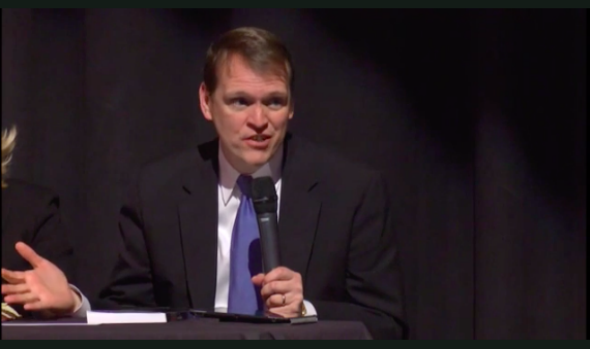Jeff Mateer has called transgender children part of “Satan’s plan,” dismissed same-sex marriage as “debauchery,” and asserted that the constitutional separation of church and state is a myth. He may soon receive a lifetime appointment to the federal judiciary. In September, President Donald Trump nominated Mateer to the U.S. District Court for the Eastern District of Texas with the strong backing of Sen. Ted Cruz. Since Senate Republicans have already voted to confirm an anti-gay blogger who compared abortion to slavery, Mateer’s comments would not appear to be disqualifying for the GOP.
Mateer’s retrograde views are dangerous on their own. What’s more dangerous is that, if confirmed, he would be in a position to adjudicate claims brought by his former employer, First Liberty Institute. Located in Plano, Texas, the law firm routinely attacks laws protecting reproductive health and LGBTQ people. Plano is within the Eastern District, and Mateer would not be required to recuse himself from suits brought by First Liberty. Quite the opposite: He would be in an excellent position to work with First Liberty to enact his alarming agenda.
Mateer may already have experience using the machinery of government to aid his old allies. While at First Liberty, he represented a Christian bishop named Tom Brown and his ministry, which the Southern Poverty Law Center classifies as an anti-LGBTQ hate group. In 2011, Brown spearheaded a recall campaign against El Paso mayor John Cook after the mayor backed an ordinance extending benefits to the same-sex partners of city employees. Cook accused Brown of violating campaign finance laws by failing to form a political action committee and making improper corporate contributions through his ministry. The Texas Court of Appeals agreed and halted the recall effort. Cook also sued Brown for damages.
First Liberty represented Brown throughout the saga. Mateer played an integral role in the case until 2016, when Texas Attorney General Ken Paxton hired him to serve as an assistant attorney general. (Paxton did not publicly advertise the position, in apparent violation of state law; he claimed that the law did not apply to his office.) In 2011, the attorney general’s office had declined to weigh in on the Brown litigation. But shortly after Mateer was hired Paxton’s office filed a brief with the county court overseeing Brown’s case, citing Citizens United v. FEC to argue that Brown could not be punished for allegedly funneling money to the recall campaign.
This argument is plainly meritless; Citizens United involved independent corporate expenditures, not direct campaigns contributions allegedly laundered through a church. But it is strikingly similar to the argument Mateer made while representing Cook—namely, that the First Amendment prohibits the government from restricting the secret use of church funds for expressly political purposes. While Mateer insisted he had nothing to do with Paxton’s sudden interest in the case, Texas Monthly reported that an email obtained through the Texas Public Information Act suggests otherwise. That email shows that Dave Welch, executive director of the conservative Texas Pastor Council, had reached out to Mateer at the attorney general’s office and asked him to intervene on Brown’s behalf.
This possible use of state resources to help Mateer’s former client infuriated progressives. The liberal Texas Freedom Network asked: “Has the Texas Attorney General’s Office simply become a branch of First Liberty Institute and that religious-right group’s political agenda?” The Freedom From Religion Foundation has argued that Mateer “used that state office to promote the [First Liberty] Institute’s agenda.” In the end, though, Mateer’s alleged intervention didn’t help: The county court rejected the attorney general’s office’s claims and Brown ultimately settled for $419,000.
The pastor lost that case because the law wasn’t on his side. Now Mateer will have an opportunity to establish his own legal precedents—perhaps even in cases brought by First Liberty itself.
Mateer has been nominated to the Sherman Division of the Eastern District. There is only one other judge currently stationed at that division, an Obama appointee. One of the courthouses in the division is a short drive from First Liberty. If the institute files a lawsuit there, it has about a 50-50 chance of being assigned to Mateer.
Unless Mateer was personally involved in litigating a case during his time at First Liberty, he won’t necessarily have to recuse himself if that case gets filed in his court. Legal ethics expert and Georgetown Law professor David Luban told me in an email that the Code of Conduct for United States Judges allows Mateer to decide whether to recuse. He could recuse himself—and probably should to avoid the appearance of partiality. But the call would be Mateer’s to make.
First Liberty takes an aggressive approach to what it describes as “religious freedom.” It consistently defends businesses’ putative right to discriminate against minorities while opposing laws that protect those minorities’ civil liberties. Until now, it has had mixed success in enshrining these radical principles into law, often failing to persuade courts that the free exercise of religion should trump constitutional equality. If Mateer is confirmed, the group will have an ally in its own backyard eager to support its crusade.
